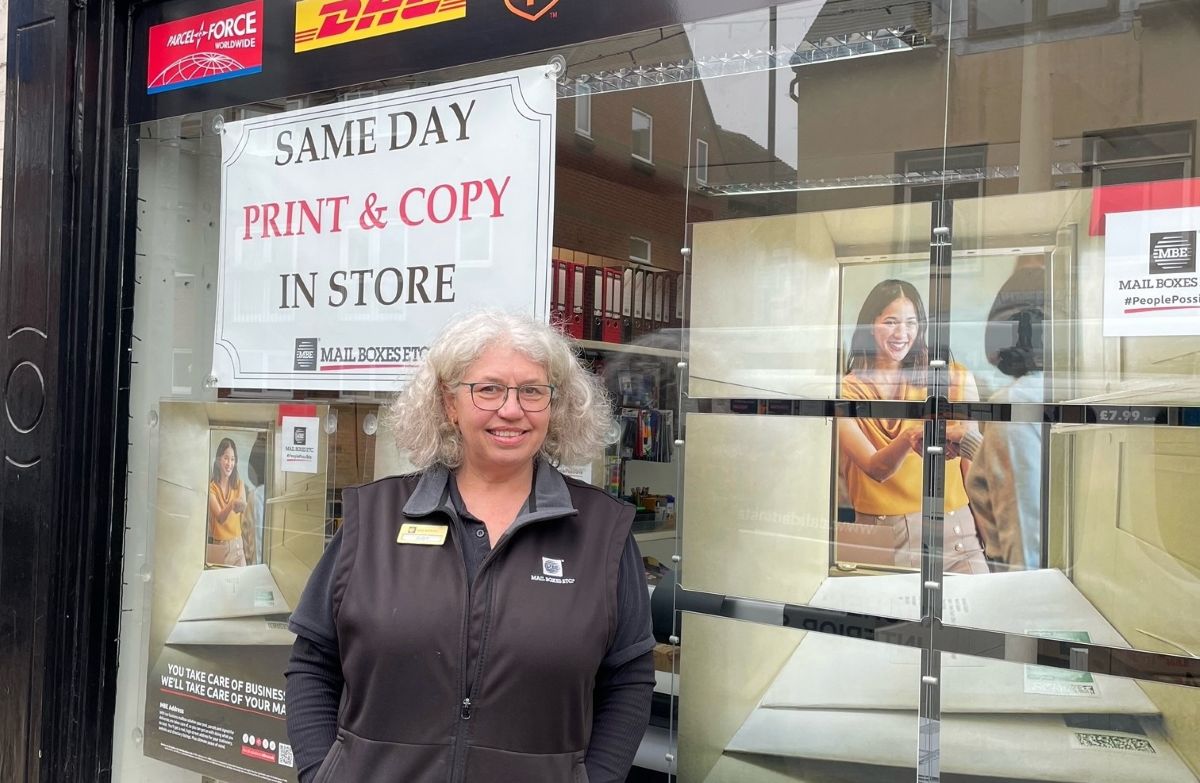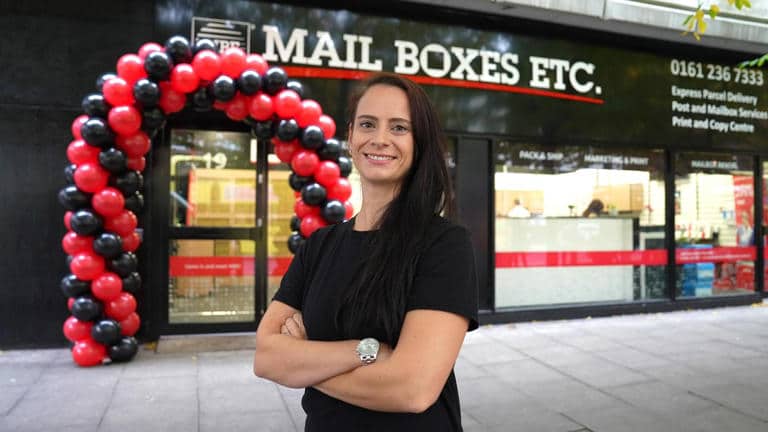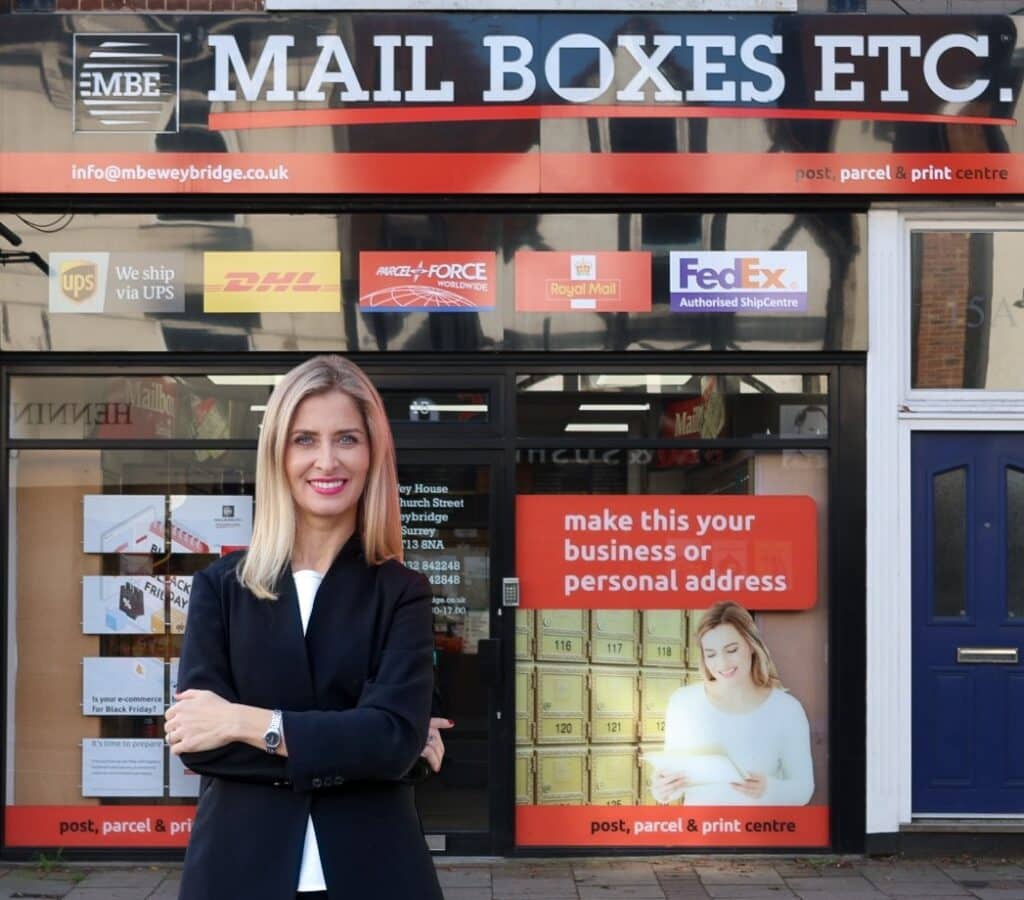
Whats The Best Franchise To Invest In

Investing in a franchise is a significant financial decision that can provide a clear and structured path to business ownership. If you’re wondering what’s the best franchise to invest in, the answer depends on your goals, skills, market conditions, and the research you’re willing to undertake.
This comprehensive guide, which includes a closer look at how owning a Mail Boxes Etc. (MBE) franchise aligns with these principles, will help you identify the best opportunities, evaluate potential franchises, and build a strategy for long-term success.
Opportunities: Industries with High Potential
The franchise market offers opportunities across a variety of industries. To identify the right fit, follow these steps:
1. Match Your Skills and Interests to the Industry
- Reflect on your strengths and preferences. Do you enjoy working with people, managing logistics, or focusing on creative projects?
- Example: If you thrive in fast-paced environments, a food franchise like McDonald’s might suit you. If you prefer a diverse business model with multiple revenue streams, consider a logistics franchise like Mail Boxes Etc.
2. Explore Growing Industries
- Logistics and Shipping: Franchises like Mail Boxes Etc. (MBE) and Pack & Send are thriving due to the e-commerce boom. MBE stands out with its combination of courier services, printing, packaging, and mailbox rentals, catering to small businesses and remote workers.
- Food and Beverage: Global chains like Subway (£50,000+ investment) or emerging brands like Creams Café (£70,000+) offer established business models.
- Fitness and Wellness: F45 (£500,000+) or boutique gyms like Barrecore (£40,000+) cater to health-conscious consumers.
- Childcare and Education: Affordable franchises like Kumon (£3,000–£5,000) or Tutor Doctor (£33,000) appeal to parents prioritising education.
- Eco-Friendly Franchises: Sustainable businesses like Green Cleen (£15,000) are gaining traction.
3. Research Franchise Trends
- Use tools like IBISWorld, Mintel, or The British Franchise Association Reports to identify trends.
- Example: The UK’s elderly care sector is expanding rapidly. Home Instead Senior Care (£40,000+) offers the chance to serve a growing market while building a profitable business.
4. Find Franchises That Fit Your Budget
- Low-Cost Options: Consider home-based franchises like Agency Express (£24,500) or Barking Mad (£15,000).
- High-Investment Opportunities: If you have access to £1 million+ in capital, look at established brands like KFC or Marriott Hotels.
Evaluation: How to Choose the Right Franchise
After shortlisting potential franchises, including Mail Boxes Etc., take these steps to evaluate each one thoroughly:
1. Understand the Financial Commitment
- Request a breakdown of all costs, including:
- Franchise fees (£5,000–£100,000+).
- Equipment costs: MBE franchises may require specialised printers, packing equipment, and point-of-sale systems (£20,000–£50,000).
- Royalties: Typically 5–10% of gross sales.
- Marketing contributions: 1–5% of monthly revenue.
- Pro Tip: Maintain 20% more than the franchisor’s estimated costs for unexpected expenses.
2. Review Financial Performance Data
- Ask for audited financial statements, including average gross revenue, profit margins, and time to break even. For example, MBE franchises typically achieve profitability within the first 18–24 months, depending on location.
3. Speak to Franchisees
- Contact 3–5 current franchisees. Ask specific questions:
- How much support did you receive during setup?
- What challenges have you faced in operating the business?
- What is your monthly revenue after 12 months?
4. Analyse the Franchise Agreement
- Hire a solicitor to review clauses about:
- Territory exclusivity: Ensure no competing MBE franchises will operate in your region.
- Renewal terms: Confirm you can renew under similar conditions.
5. Assess Local Market Demand
- Use Google Trends and ONS Statistics to gauge demand. For example, MBE franchises thrive in areas with a strong small business community or high e-commerce activity.
Advice: Steps to Maximise Success
Once you’ve chosen a franchise, implement these strategies for long-term growth:
1. Secure Financing
- Approach banks offering franchise loans, such as Lloyds or HSBC. Prepare a business plan that includes:
- Cost projections, including equipment and marketing expenses.
- ROI and break-even timelines.
2. Plan a Local Launch Campaign
- Allocate at least 10% of your start-up budget for marketing.
- Specific tactics for MBE:
- Partner with local small businesses to promote MBE’s printing and courier services.
- Distribute flyers targeting nearby e-commerce sellers and remote workers.
- Run targeted Facebook Ads (£500/month) focusing on local business owners.
3. Automate Operations
- Use tools like Xero or QuickBooks for financial tracking.
- Implement customer management systems like HubSpot or Zoho CRM.
4. Measure and Optimise Performance
- Track key metrics monthly:
- Revenue growth and profit margins.
- Customer retention rates.
- Marketing campaign performance.
5. Expand Strategically
- MBE offers opportunities to scale by opening additional locations or diversifying revenue streams. Work with the franchisor to identify growth opportunities in new territories.
Why Mail Boxes Etc. Stands Out
Owning a Mail Boxes Etc. franchise is an excellent example of how to implement the strategies outlined in this guide. MBE provides a proven business model with diverse revenue streams, including courier services, mailbox rentals, printing, and packaging.
This flexibility makes it well-suited to entrepreneurs looking to cater to small businesses, remote workers, and e-commerce sellers. With robust franchisor support, including training, marketing resources, and operational guidance, you’ll have the tools needed to succeed.
By leveraging the steps in this guide—evaluating local market demand, automating systems, and planning targeted marketing campaigns—you can maximise your investment and build a thriving business within the MBE network.
Final Thoughts
When asking what’s the best franchise to invest in, the answer depends on your interests, financial capacity, and the diligence you apply to research and evaluation.
Franchises like Mail Boxes Etc. exemplify the combination of proven systems and growth potential that investors should seek. By following this guide, you’ll be equipped to make informed decisions and create a path to long-term success.

International Women’s Day Profile: Judy Veniamaki

Mail Boxes Etc. has many successful women franchisees and centre managers across its network. To celebrate International Women’s Day this year, we spoke to Judy Veniamaki, who runs Mail Boxes Etc. Chichester.
After six years of secretarial work and office admin in the UK and twenty-five years in Greece working in tourism and hospitality, Judy joined the team at MBE Chichester with Kal Chudasama when he took over the franchise in 2016. They learnt the job together and very quickly became a team.
As manager of the store, Judy enjoys the variety of the business, which includes mailbox rental, packing and shipping parcels to destinations around the world, and looking after customers’ print requirements.
“It’s very important to me to build strong relationships with our customers,” she says, “and to ensure our service meets all their expectations. Communication is vital – especially if people are ordering online. When people use us to ship their items, we make a point of notifying them of the progress of their consignment every step of the way.”
Antiques And Art Shipping
A lot of Judy’s shipping work is focused around valuable and fragile items. “We collect antiques and works of art from local auctioneers and antiques shops, which makes each job a very personal and unique experience for everyone involved.
“We get to handle some lovely items which are very precious to our customers and we pride ourselves in taking the best possible care, from packing breakable pieces with expertise to choosing the right carrier to handle the packages.”
Over the years, Judy has had to learn plenty of new skills, including specialist packing techniques and making sure she’s on top of customs requirements. She loves the fact that each day brings something different: “We never know what the next job will be, and I like the thrill of each new request. We discuss each consignment as a team and our different approaches mean we’re sure to cover all bases to ensure each customer has the right solution for their needs.”
Judy’s customer base includes mailbox customers, from private individuals and small businesses to remote users who have their mail forwarded. “Our services are very well suited to SMEs, as we can often help them by taking on their shipping needs too, which frees their time up to focus on other parts of their business.”
When it comes to growing the business and being able to offer customers new solutions, Judy says:
“We are particularly pleased with how we have increased our print services by investing in a new Xerox finishing machine, which enables us to produce leaflets, business cards and booklets quickly and professionally. We also have a wide format printer, which has proved to be popular as we offer a same-day service. Our customers find this really useful for everything from plans and legal documents to posters, and they love the fact that the turnaround is so speedy.”
Female Friendly Business Model
Anyone running their own business faces challenges, but Judy believes Mail Boxes Etc. is a business model that’s very well suited to women. “In this line of work, attention to detail is imperative, and I think most women are skilled in this area. Thinking outside the box is a good thing, too.
“It’s great to be part of a team. As manager of the Chichester store I have the support of my colleague Abi, which is so important. We work very well together, and we both really care about our customers. I think that shows when you read our online reviews; our customers are more than happy to share their positive feedback.”
Judy finds that the work-life balance at the store suits her very well.
“Although always busy, I’m never overwhelmed in my role. Working with another woman is great and we love working for Kal, he’s a fantastic boss, very supportive and encouraging.”
How To Make A MBE Franchise Successful
Judy’s advice for anyone thinking of working in, or owning, an MBE franchise is to get a good team together: “So necessary when you run a small business.”
She also says women should work on self-belief:
“Your past career choices teach work skills every step of the way; use them to build your own success. I am working in retail now, but my time in hospitality gave me the skill of attention to detail, while working in tourism taught me to think quickly to find a suitable solution. All the new technology needs to be embraced, but that’s true in any job, and change is hard for most people, but accepting it and learning new skills will keep your business – and your mind – growing.”

Franchisor Brand: Support Roles and Expectations

Joining a business model provided by a franchisor is a valuable opportunity that offers those who intend to set up their own business the advantage of being involved in a consolidated system based on proven methods and benefiting from the support of an established brand for their business, from the start-up phase.
One of the main difficulties that those who want to start a new business must face is the immediate availability of economic resources and tools, but above all the need to build their own brand and a customer base from scratch. Relying on a franchisor allows you to enter a commercial network already consolidated on the market and to be able to count on a low-risk and low-cost commercial operation.
Affiliation with a franchisor allows you to save on organizational costs that weigh on those who start a business from scratch and often includes a design plan for the layout of the store and furniture.
But who is the franchisor? How important is his support? And what services can you expect when you decide to open a franchise?
Point 1: Being part of a franchise network offers the opportunity to leverage proven methods to start your new business.
Point 2: One of the most important advantages of a franchise business model is the ongoing support and constant backing of an established brand.
Who the franchisor is and what his obligations are
The franchisor is the parent company that grants its affiliates, called franchisees, the right to use its brand, its products or services and its know-how to develop their business. In addition to providing a consolidated business model, the franchisor defines the operational guidelines that guarantee the uniformity and quality of the entire network, thus contributing to the start-up and consolidation of affiliated commercial activities.
Among the franchisor’s main obligations is the creation and constant updating of the management model, integrating innovations and market strategies to keep the entire commercial network competitive. Furthermore, it must monitor and support its affiliates, not only in the start-up phase, but also throughout the duration of the contract, with training tools, updates and personalized promotional plans.
However, its role is not limited to operational support: the franchisor acts as a strategic guide, facilitating market entry and promoting the expansion of affiliated businesses through industry analysis and solutions that respond to market challenges. This balance between the managerial autonomy of franchisees and the duties of the franchisor is one of the key elements of this business model.
In addition to these aspects, one of the main obligations of the franchisor is to ensure transparency and fairness towards its affiliates. This includes providing clear and detailed information on the business model, the costs of affiliation and the performance guaranteed by the commercial network. Furthermore, the parent company is required to respect contractual agreements, for example by providing the agreed support and ensuring that the affiliates can operate in a competitive environment free of internal conflicts, such as unauthorized territorial overlaps.
A further obligation of the franchisor concerns the supply of goods or tools necessary for the activity, an element particularly relevant in distribution franchising, but also present in service franchising. Finally, it is the franchisor’s obligation to transmit to its affiliates the distinctive signs of the brand, guaranteeing them the right to use trademarks, signs and other elements of industrial or intellectual property that identify the brand.
The most important types of franchisor support
The franchisor’s support for new affiliates can vary significantly based on the type of contract and the sector, however there are some services that constantly characterize the start-up phase of a new business and which can be fully included among the advantages of franchising. Here are the most important types of support offered to affiliates:
- Support in identifying possible financing options. Having an overview of the expenses to be incurred is important especially in the start-up phase of the business, also in order to determine an effective operational plan.
In this context, in addition to the assistance provided by their own consultants, it is clear how important it is for affiliates to be supported by the parent company in order to evaluate any available financing options necessary to be able to meet the expected costs.
- Equity, loans, grants or subsidies: the franchisor’s support will be useful to analyze the different options and help you choose the one best suited for your business.
- Location selection. The brand’s support in selecting the physical location is important. In addition to the evaluation and choice of location for the new business, franchisees are sometimes provided with an indication of an exclusive geographic area within which no other centers will be authorized to open (except for any specific exceptions provided for in the franchising contract).
Only then will the works compliant with local building regulations have to be carried out in to develop the space according to the brand requirements: thanks to the franchisor’s support, it is possible to prepare a detailed design plan for the furnishings, layout, and furniture with particular attention to cost optimization and expense containment.
- Training and operating methods. Training is certainly one of the most important support services provided by the franchisor to the benefit of affiliates, essential for learning how to effectively manage the new business. In addition to informing affiliates about operating methods and providing instructions for completing all processes and management protocols correctly, continuous training is a fundamental tool for ensuring the achievement and maintenance of quality standards, learning about any product or service innovations, from new equipment to software.
In-store or in the field, the focus should therefore be on the basics of how the system works, in particular on acquiring skills for business development. Initial training courses are often supplemented by additional training sessions to constantly support know-how and develop professional sales skills. In addition to training, administrative and technical support can be provided in the initial phase in order to improve performance and ensure better adherence to brand standards. - Framework agreements. Among the support services that a franchisor can provide to affiliates is also the possibility for affiliates to benefit from framework agreements signed by the parent company with certain suppliers of products or services.
Franchisees are advised to purchase from approved suppliers, with the aim of promoting economies of scale and working with suppliers capable of offering a consistent level of quality across the network.
- Advertising and Marketing. Advertising and marketing are two essential components for the introduction and promotion of a new business. This is why they cannot be missing from the franchisor’s support activities for affiliates: in addition to obtaining practical guidance and assistance for the inauguration, affiliates can receive assistance in starting campaigns to promote brand awareness and take advantage of marketing solutions designed specifically for the business in question, to reach customers online and offline.
Why choose MBE as your franchisor?
An internationally established network like MBE can offer several business tools to those who open a franchise, as well as a wide range of services that allow local businesses and residents to solve everyday challenges. Becoming an MBE franchisee means joining a network of 1,800 Service Centers worldwide: a system that provides continuous support and assistance to optimize your time.
MBE promotes entrepreneurship and provides all the ingredients needed to start a new business in a dynamic sector, such as that of services to businesses and individuals: the solution for those who want to start a new business counting on the solidity of an established brand or for those who are already entrepreneurs and intend to invest in the services sector.
MBE training is not limited to the start-up phase of the business. However, it is an integral part of a system that aims to enhance and increase the talent of the affiliates and their team. MBE includes updates on the new solutions proposed, meetings and workshops with a focus on business development and on new technologies and digital innovations to offer to customers.
The training takes place in the classroom, online and in the field, where expert Entrepreneurs are often involved who act as Certified Centers, specialized in supporting new entrepreneurs. In this way, a relationship is established between experienced senior entrepreneurs and new affiliates, where the interaction with expert and competent figures is one of the elements of great value that distinguishes the MBE world.
In addition to training, MBE also provides constant support from the Network thanks to teams of experts working in the area. Figures in close contact with the affiliates, who support the franchisees from the start of the business. Training and support in MBE are one of the elements of great value for those who choose to become part of the MBE Network.
Contact us and discover our business model

Franchising: What It Is and How It Works

How Franchises Work
Franchising methods vary depending on the industry and business type. Below are examples of how franchising operates across different sectors:
Industrial
Common in industries like restaurants, this model involves the franchisor providing not just the license and brand but also production techniques and technologies. The franchisee operates as part of a network, producing and distributing goods under the franchisor’s guidelines.
Distribution
In this arrangement, the franchisee receives knowledge and commercial techniques to sell products. In return, they pay the franchisor an initial entry fee or ongoing royalties to access the franchise’s established systems and resources.
Services
Focused on selling services rather than products, this model is widely used in sectors such as travel and consultancy.
Organisational Models
Franchises can also be structured based on how the franchisor and franchisee collaborate:
- Direct: The franchisor partners with local operators to establish a brand in a foreign market, particularly where the brand is already well-known.
- Indirect: The franchisor involves a third-party investor who assumes the financial risks and responsibilities, often used for culturally or geographically distant markets with complex distribution needs.
Franchising benefits both parties. The franchisor expands their network and brand presence without managing physical locations, while the franchisee leverages a proven business model to reduce the risks of starting a new venture, even without industry experience.
How to Open a Franchise: Costs to Consider
Starting a franchise requires evaluating both operational and financial commitments. While franchisors provide significant support—ranging from skills transfer to operational compliance—there are specific costs involved:
- Entry Fee: A one-time fee granting the franchisee the right to join the business.
- Turnover Percentage: A share of profits, often paid periodically or for the entire duration of the partnership.
- Advertising Contribution: A fee to support national or local marketing campaigns initiated by the franchisor.
- Additional Costs: This may include expenses for tools, equipment, or bank guarantees for securing goods.
MBE Franchising: A Global Network
MBE’s franchising system offers internationally negotiated agreements, enabling franchisees to overcome challenges through effective teamwork and constant operational support.
With over 1,600 service centres worldwide, joining MBE provides access to a global network of entrepreneurs.
Franchisees benefit from extensive assistance, training, support, and potential financial advantages.
By partnering with Mail Boxes Etc in the UK, you gain the tools to establish a successful business while contributing to the shared achievements of a thriving global network.

Unveiling Fortidia: MBE Worldwide Group’s New Identity

MBE Worldwide – a privately held multinational company headquartered in Italy and operating globally – changes its Group brand identity to Fortidia, and consolidates its international positioning in the e-commerce, fulfilment, shipping, marketing and print sectors, addressing the market with a brand that fully encapsulates the essence of the Group’s capabilities and aspirations.
Fortidia is the new home for the Group’s brands: PrestaShop, Mail Boxes Etc., PostNet, PACK & SEND, World Options, AlphaGraphics, Multicopy, Print Speak, GEL Proximity and Spedingo. All Fortidia brands are united by a shared vision: to multiply opportunities for businesses and consumers, thus supporting those customers in achieving their ambitious goals.
“We are at a pivotal moment in the life of our Group. As we continue to grow and expand, we felt the need to define a Group branding that better represents our common mission and aspirations,” says Paolo Fiorelli, Chairman and CEO of Fortidia.

The Group started in 1993 when the Fiorelli family commenced operations in shipping and fulfilment in Italy under the Mail Boxes Etc. brand. In more than three decades since, the Group has expanded strategically into additional areas including e-commerce, digital solutions, and marketing and print, emerging as a leading platform for global commerce for SMBs and consumers.
In 2023, the combination of its physical platform -including 3,200 Business Solutions Centres in 60 countries – with its PrestaShop e- commerce platform served 1.1 mln business customers worldwide generating €1.4 bln (US$1.5 bln) of System-wide Gross Revenue and €22 bln (US$23.8 bln) of Gross Merchandise Value.
Reflecting these foundations, Fortidia is not just a new identity, but rather, an embodiment of the current and future vision of the Group. The name derives from the Latin expression “Fortis Idea,” symbolising a combination of strength, courage, and reliability, along with reflecting the Group’s belief in the ability of people to make a
difference and sustain continuous growth over time.
“The new branding reflects our unwavering commitment to helping businesses and consumers multiply opportunities thus accomplishing their ambitious objectives. Our strength, resilience, and daily dedication to customers’ growth are symbolized by this powerful name,” Fiorelli concludes, emphasizing how “this is reflected in Fortidia’s
purpose: Empowering People locally to Power Business globally.”

Mail Boxes Etc. relaunches Manchester Piccadilly as Northern Flagship

Mail Boxes Etc. has relaunched its Manchester Piccadilly service centre as a flagship store for the North of England, which will double up as a training centre for its national franchise network.
Mail Boxes Etc. is the world’s leading third-party provider of shipping, fulfilment, print and marketing solutions to small and medium enterprises and consumers, with a network of over one thousand eight hundred franchise locations in forty eight countries.
The Italian-owned company has now completed a total overhaul and relaunch of the Lever Street store in Manchester city centre, which previously suffered significant flooding damage in late 2023.
Featuring the very latest branding and facilities, the revamped store will now serve as a benchmark outlet, and a training facility for the company’s over one-hundred franchisees from across the country.
Mail Boxes Etc. Learning & Development Manager Lauren Singleton said: “We’re incredibly proud to relaunch our Manchester Piccadilly store as a national flagship outlet and training centre for our national network.
“As a brand, Mail Boxes Etc. is currently bucking the trend on UK high streets and is one of the few chain store outlets opening more stores.
“We believe that’s because our service range meets a growing need, especially with the boom in ecommerce and working-from-home businesses, as well as many companies who in the past might have traded locally now trading nationally and internationally, who want a professional solution for shipping worldwide, or a postal mailbox separate to their operational or residential address.
“For shipping, we take away the burden of choosing the right shipping partner for each package and help with documentation to ensure packages arrive with less likelihood of delays, and our packing solutions are extremely attractive to people exporting and importing fragile items.
“In an increasingly online world, we are proud to still maintain that walk-in capability, where you can discuss your needs with a living, breathing human, which is why training of our franchisees is so important.
“The Manchester Piccadilly outlet will now be a central component of our training ongoing, while also providing access to all our facilities for the people living and working in the vibrant heart of one of the UK’s most exciting cities.”

The new owner of Mail Boxes Etc. Weybridge aims to enhance local business imports and exports.

Having taken over the Mail Boxes Etc. in Weybridge, the new owner has outlined her vision for the store to help local businesses better import and export worldwide
Nessy Vallis acquired the Mail Boxes Etc. business, which has been a fixture on Church Street for around twenty years, in September this year, following a successful fourteen-year career in international sales, specialising in the print industry.
Her ambition in growing the service centre as part of the local community is to develop relationships with key customers from the surrounding areas to help them trade nationally and internationally, while also aiming to grow the walk-in design and print offering for local businesses too.
Outlining her growth plans, she said: “Mail Boxes Etc. is the world’s leading third-party provider of shipping, fulfilment, print and marketing solutions to small and medium enterprises and consumers across the globe, with a network of over one thousand eight hundred franchise locations in forty eight countries.
“As a brand, it’s currently bucking the trend on UK high streets and is one of the few chain store outlets opening more stores, which I believe is because its service range meets so many growing needs.
“For instance, the emergence of so many ecommerce and working-from-home businesses in Weybridge and the surrounding areas means there are a huge number of people who want a professional solution for shipping worldwide, or a postal mailbox separate to their operational or residential address.
“For shipping, we take away the burden of choosing the right shipping partner for each package and help with documentation to ensure packages arrive with less likelihood of delays, and our packing solutions are extremely attractive to people exporting and importing fragile items.
“We also specialise in securely sending sensitive and high value paper documents, and our mailboxes provide a great solution for businesses operating from home who would rather not share their home address with customers.
“I’m looking forward to bringing all that to the people and businesses of Weybridge, helping local entrepreneurs and established businesses to go national and international, with a friendly, face-to-face customer service through our high street service centre.”
Mail Boxes Etc. is part of MBE Worldwide, which in 2023, served over one million business customers worldwide through its multi-brand operations, generating €1.4 billion.

Top Growing Business Sectors for Investment
Market Trends and Key Economic Sectors Offering the Best Investment Opportunities

Investing in expanding economic sectors is a strategic decision for entrepreneurs and investors keen to capitalise on market opportunities.
In recent years, several industries have shown consistent growth, drawing increasing interest from those seeking profitable ventures. However, making informed choices requires a clear understanding of market trends, analysing opportunities, and identifying the business areas with the greatest potential for growth.
Some economic sectors have demonstrated remarkable resilience and an ability to develop, attracting more investors. For instance, McKinsey highlights how companies in technology, media, and telecommunications have experienced significant returns, driven by innovations like generative artificial intelligence. Similarly, the rise in online shopping has pushed businesses to invest in more efficient logistics solutions to meet the demand for fast, reliable deliveries. The growth of e-commerce has made warehouse management, freight transport, and distribution essential to keeping up with market demands.
In this guide, we’ll explore the primary growth business sectors, focusing on the trends transforming the global economy. With a thorough analysis of data and forecasts, we’ll identify the industries that offer solid returns in both the short and long term. Discover the most promising sectors where franchising presents an excellent way to start a business, offering the advantage of a proven model supported by a strong and reputable brand.
5 Economic Sectors to Invest In
The economy has undergone significant transformations in recent years, driven by technological advancements, shifting consumer behaviour, and an increased focus on sustainability.
This shift has opened up new and growing sectors that offer lucrative opportunities for investors and entrepreneurs looking to open a franchise business. Understanding and identifying these markets is crucial for capitalising on future trends and seizing the opportunities created by global economic changes. Below, we examine the most important growth sectors poised for expansion in the coming years.
1. E-commerce
B2B and B2C e-commerce has revolutionised how people interact with businesses and purchase products and services. After a surge in demand, the sector continues to grow steadily, offering one of the most attractive investment opportunities of recent times. Digitalisation has made online shopping an essential part of daily life, enabling consumers to access a vast range of products with just a few clicks. Fast delivery services and secure digital payments have further enhanced the shopping experience.
A study by Market Research notes that fast-growing markets, such as China and Latin America, continue to drive this expansion. In particular, China leads the global e-commerce sector, with giants like Alibaba and JD.com dominating both local and international markets.
The rise of omni-channel shopping, which integrates physical and virtual stores, along with advanced technologies such as artificial intelligence and augmented reality, is improving the convenience and personalisation of online shopping. Investing in the e-commerce sector is a strategic move, not only to tap into rising global demand but also to contribute to the evolving digital commerce landscape.
2. Logistics and Shipping
The rapid expansion of e-commerce has transformed logistics into a critical strategic element for business growth. Managing the supply chain efficiently, from warehousing to final distribution, has become an increasingly complex yet essential challenge for supporting a company’s core operations.
Transport and shipping firms are adopting innovative technologies to improve efficiency, including warehouse automation, delivery drones, and data analytics to optimise transportation routes. The aim is to offer faster, more accurate deliveries while reducing operating costs and minimising environmental impact.
This trend is especially evident in emerging markets like the Asia-Pacific region, where the demand for advanced logistics solutions is rising in tandem with the growth of e-commerce. Investing in logistics means positioning yourself at the heart of economic transformation, leveraging the vast opportunities driven by digital markets and the need for more sophisticated logistics solutions.

3. Artificial Intelligence
Artificial intelligence (AI) is revolutionising every sector, driving unprecedented innovations and creating new avenues for economic growth. From industrial automation that optimises production processes to personalised services that enhance customer experiences, AI is a key driver of global transformation.
AI applications are diverse: advanced data analytics help companies predict trends and consumer behaviour, while generative AI boosts business efficiency by reducing waste and increasing productivity. In sectors like healthcare, logistics, and financial services, AI is making processes faster and more precise, enhancing the quality of services offered.
As one of the most promising sectors, AI presents excellent investment opportunities in both established and emerging markets. Investing in AI allows businesses to anticipate future societal needs and actively contribute to a more efficient, automated economy.
4. The Green Economy
With growing awareness of environmental issues and the urgent need to address climate change, sustainability is at the forefront of global economic discussions. The green economy has emerged as a vital model for tackling ecological challenges while creating new avenues for economic development. Stricter environmental regulations aimed at reducing carbon emissions and promoting responsible resource use have accelerated the growth of sustainability-focused industries.
Sectors such as renewable energy, energy efficiency, the circular economy, and low-impact technologies are experiencing unprecedented growth. Renewable energy sources, such as solar and wind, are becoming more accessible and competitive with fossil fuels, encouraging businesses and governments to invest in sustainable solutions.
The green economy extends beyond energy to include sustainable agriculture, electric mobility, water resource management, and eco-friendly materials. This growing sector attracts not only governments but also private investors and companies, positioning the ecological transition as a prime opportunity for growth.

5. Health and Wellbeing
The healthcare sector is undergoing a significant transformation, with a growing focus on prevention and wellbeing. More people are adopting healthier lifestyles, prioritising both physical and mental health. This shift has opened new business opportunities for companies providing innovative and personalised solutions to improve quality of life.
Technology plays a central role in this revolution. Telemedicine has made healthcare more accessible, while wearable devices monitor vital signs, increasing awareness of individual health. These technologies, combined with augmented reality and early diagnostics, are changing how people care for themselves. Arizton Advisory and Intelligence predicts that revenues in the health and wellness sector will grow by more than 20% in the next four years. This focus on personal wellbeing makes the health market one of the most promising sectors for investment.
By opening a Mail Boxes Etc. (MBE) franchise, you can offer services designed to support businesses across these growing sectors. MBE helps companies optimise logistics and international shipping, ensuring efficient, fast, and secure deliveries worldwide.
Additionally, MBE offers tailored solutions in printing, marketing, and e-commerce order management, allowing companies to focus on their core operations while MBE handles their logistical needs.
Open an MBE centre and start your business journey today.

Pros and Cons of a Franchise Business
Advantages and disadvantages of opening a new business in franchising.

Investing in a franchising business is a strategic choice for many entrepreneurs, as it allows them to start a business by taking advantage of the support and reputation of a brand that’s already established in the market. However, before making this decision, it’s important to analyse both the advantages and potential disadvantages associated with this business formula. Being aware of the pros and cons of franchising in advance means you can make a more informed choice, ensuring your chosen business model truly aligns with your needs and long-term goals.
If the advantages of this business model meet your growth objectives, it can represent a unique opportunity to start a successful business, accelerate expansion and consolidate your presence in the market. According to data reported by Apps that deliver, a new franchise is inaugurated every 8 minutes, a clear sign of the growing popularity of this business formula. In this guide we will look at the advantages and disadvantages of franchising to help you understand whether this is the right choice for your business aspirations and offers the growth opportunities you’re looking for.
Point 1. According to Technavio, the global franchising market will exceed $1.9 trillion in the next four years, registering a growth rate of over 10%.
Point 2. The digitalisation of in-store sales methods by franchisees will drive future market growth.
Opening a Franchise: Advantages and Disadvantages
Franchising is one of most popular business formulas for people who want to start a business with the support of an already established brand. However, like any business model, it is important to evaluate each aspect carefully as it can significantly influence the sustainability of your business in your chosen market.
The advantages of franchising
This business development formula combines management independence with the support of a brand that’s already established in the marketplace. From reducing risks to the opportunity to exploit proven strategies, here are the main advantages:
- Low business risks. One of the main advantages of franchising is the reduced entrepreneurial risk. Because it is based on a business model that has already been tested, new partners can access a formula that has already proven its effectiveness in different markets and geographical contexts. This significantly reduces the uncertainties related to starting a business from scratch offering a greater chance of achieving your business development goals right away. In addition, some companies allow their franchise partners to take over an already established business: a unique opportunity for those who want to enter the market more quickly.
- Proven development model. Affiliates have access to a development model that provides them with all the systems and know-how needed to start and run their business. This means that the operational processes, marketing strategies and sales techniques have already been perfected by the parent company, which offers franchise partners clear guidance on how to manage their new business. In addition, major brands provide their partners with financial and tax benefits that allow them to run their business more efficiently, reducing operating costs and optimising available resources. This ensures more sustainable growth and greater profitability in the long term.
- Centralised marketing campaigns. Another advantage of franchising is the centralised management of marketing campaigns by the parent company. This relieves the franchisee from the burden of planning and managing their own promotional initiatives, allowing them to benefit from the results produced by marketing strategies undertaken on a national and international scale. As a result, the brand achieves greater visibility and marketing costs are distributed among all franchisees, making campaigns more effective and accessible. Some brands also offer partners strategic support, ranging from analysis of the local commercial area and target market to interior design and brand identity consultancy.
- Continuous support and training. Another major advantage of franchising is the training and ongoing support provided by the parent company. This includes not just the help given during the start-up phase, but also ongoing support throughout the duration of the partnership. Affiliates have access to training courses, updates on industry best practice and operational support, ensuring that they are always aligned with the latest market trends and can face and overcome the daily challenges of business management.

The Cons
Franchising also has some aspects that can represent challenges for anyone starting their own business. Understanding them is essential to evaluate whether this formula of commercial development is really the best choice for you.
- Predefined procedures. Franchising implies the need to comply with procedures and guidelines established by the parent company, as each process must follow established standards that are necessary to ensure brand recognition on an international scale and offer a quality service to customers. Although this guarantees the consistency and reliability of the brand, it could be limiting for someone who wants to assume all the risk and try to bring innovation or customisation to their business that’s more in line with their own development ideas.
- Payment of royalties. Most franchising contracts provide for the payment of royalties to the parent company, which represent a percentage of the turnover or profit generated. Although these royalties finance the support and services offered by the franchisor, they must be carefully considered in the calculation of operating costs. On the plus side, it’s important to remember that royalties allow affiliates to access resources that are crucial to the success of their business, helping to support the brand’s growth and competitiveness in the marketplace.
- Less autonomy and flexibility. Franchising involves less autonomy and flexibility in the operational management of the business. Strategic decisions, corporate policies and marketing campaigns are generally established by the parent company, leaving the franchisee less room to make independent decisions. This can be a limitation for entrepreneurs who want to have complete control over their business by quickly adapting the strategy according to their personal intuitions. However, following already proven processes offers the partner the security of operating within a system that has already proven its effectiveness, reducing the risks associated with untested business choices.
After considering the pros and cons of franchising, it is important to choose a partner that offers a solid balance between support and management autonomy. Investing in a franchise with Mail Boxes Etc. means accessing a consolidated business model with over 30 years of experience and a thriving brand, active in more than 40 countries around the world.
Our business model is designed to support entrepreneurs who want to become the point of reference for SMEs and private customers in strategic sectors such as e-commerce, logistics and shipping. Opening an MBE centre offers you the opportunity to be part of a global network that will support you as you start and manage your own business. MBE will also provide you with all the help you need going forward, offering marketing techniques and tools designed to expand and consolidate your business.

How to do marketing for franchising

Marketing for franchising represents a key element to guarantee the visibility and attractiveness of a commercial franchising business in its reference market.
It is not limited to simple brand promotion, but involves a series of strategic activities aimed at strengthening the presence of the brand, attracting new users and retaining existing customers.
Marketing for a franchise can make the difference between a business that merely survives and one that thrives: strategies will also need to be adapted to the specific needs of the local market. Through targeted techniques such as online promotional activities, local campaigns and brand identity management, franchisors can create added value for their franchisees, offering them the tools necessary to thrive in the market.
There is a direct relationship between the adoption of a digital marketing franchising strategy and sales: according to the data released by HubSport, within the State of Sales Report study, over 90% of potential customers declare that they carry out research before speak to a company sales representative. This behavior highlights the importance of franchise marketing and how it can guide consumer decision-making, increasing conversions and the closing rate of sales.
Its importance is also confirmed by those involved in selling B2C or B2B services or products: according to HubSpot, over half of sales managers use the contents provided by marketing activities to conclude commercial negotiations.
In this guide, we will explore the main franchising marketing strategies that can significantly boost your business, illustrating how each can be implemented and adapted to maximize your return on investment.
Point 1. 96% of potential customers do research before speaking to a sales representative.
Point 2. According to a LinkedIn study, companies that use social selling are 51% more likely to reach their sales goals.
What Is franchise marketing?
Franchise marketing refers to all those promotional activities adopted by a brand that aims to increase its awareness and the profits of the individual affiliated units. The marketing plan for a franchise therefore includes brand awareness campaigns and advertising messages that consolidate the company’s identity on the market. In this way, a chain of stores spread internationally and distributed across multiple local locations manages to strengthen and maintain a common identity that reinforces the sense of belonging to the brand.
This activity therefore involves mutual collaboration between the company and its commercial partners, aimed at promoting the brand image and building customer loyalty. This coordinated approach is essential to building a strategy that produces benefits for both the parent company and its local units. We can therefore distinguish two types of franchising marketing:
- Marketing for franchise development. It focuses on brand expansion with the aim of attracting new affiliates. The operational activities are therefore designed to attract potential partners and expand the commercial network in the main target markets. In this case, content production activities, promotion on social networks and advertising campaigns are used to consolidate the presence of the brand and attract entrepreneurs interested in opening new operational offices.
- Marketing for franchise development. It focuses on brand expansion with the aim of attracting new affiliates. The operational activities are therefore designed to attract potential partners and expand the commercial network in the main target markets. In this case, content production activities, promotion on social networks and advertising campaigns are used to consolidate the presence of the brand and attract entrepreneurs interested in opening new operational offices.
- Operational franchise marketing. It focuses on the local activities of individual franchise units rather than on the visibility of the main brand. It is particularly useful for connecting each individual affiliated unit to the larger brand and for supporting local entrepreneurs when starting and running their own business. For example, a store chain could plan geo-localized campaigns that allow it to attract new customers interested in the company’s products or services or develop promotions that apply to all branches.
Marketing Strategies for franchising
Strategies for promoting commercial affiliate networks are fundamental to guarantee the visibility and development of each point of sale within the franchise catchment area. The launch of advertising campaigns allows entrepreneurs to make contact with new potential customers, measuring the impact of each activity on final sales. Let us discover the main marketing strategies for franchising.
- Digital Activity. A solid online presence is essential for any business. The local store’s website must be well structured, easy to navigate and optimized for mobile devices. The use of social platforms also allows you to interact with the public, share updates and discounts by publishing engaging content. Affiliates can also benefit from the advantages deriving from sending newsletters, with which it is possible to keep customers updated on news, promotions and events.
Moreover, managing a blog can help showcase the company’s know-how and attract organic traffic: it is necessary to create an editorial plan that covers topics relevant to the target audience, using SEO techniques to improve positioning on search engines. Finally, it is essential to plan targeted advertising campaigns on Google Ads, Facebook Ads and other platforms, using advanced targeting tools to reach the desired audience interested in the company’s services.
- Offline activities and events. Despite the importance of digital, offline activities continue to play a crucial role. Organizing local events, participating in sector fairs and creating community engagement initiatives can strengthen the connection with the territory and increase the visibility of your business. These occasions offer the opportunity to interact directly with customers, creating original shopping experiences and strengthening brand loyalty.
In addition to organizing events, the importance of other offline activities cannot be underestimated. Distributing promotional material such as flyers, brochures and branded gadgets at strategic points in the city can increase brand awareness in the local market. Sponsoring sporting events or participating in charitable initiatives can also improve the company’s reputation and create a positive image externally. Finally, establishing partnerships with other local businesses to launch joint offers and promotions can further broaden the company’s awareness in the local community.
- Customer database management. An updated and well-managed database is essential to the success of any promotional activity. The collection and analysis of data relating to your target audience allows you to segment the public based on various parameters, allowing you to personalize communications and develop targeted offers that respond to the specific needs of each segment. Among the first elements to consider when marketing for franchising is the use of a CRM (Customer Relationship Management) system, with which to monitor all interactions with customers and identify cross-selling and up-selling opportunities.
In addition to managing your existing database, it is equally important to focus on lead generation. Generating new qualified contacts through different strategies, online or offline, ensures that the database is continuously enriched with new potential buyers, maintaining a constant flow of commercial opportunities and contributing to long-term business growth.
Strategic marketing activities for franchising allow entrepreneurs to seize all the opportunities offered by the commercial model chosen to start their business. Mail Boxes Etc. offers its partners a mix of online and offline activities designed to promote the brand and intercept new customers within their geographic market. A team of experts supports entrepreneurs by offering a wide range of digital tools and advertising materials, with which to promote services to SMEs and private individuals.
From the analysis of market data to the selection of the most suitable geographical area to start the new business, from interior design to brand identity consultancy, Mail Boxes Etc. will be by your side during the opening and management of your new business.
Discover the MBE marketing services and start your own business.

What To Look For When Buying A Business For Sale

Venturing into franchise ownership offers a unique blend of entrepreneurial independence and the structured support of an established brand.
This path can be particularly enticing for those looking to invest in a retail business, where understanding the nuances of franchise operations, including royalty fees, financing, and location selection, becomes crucial.
Mail Boxes Etc. (MBE) exemplifies a franchise model that not only offers a diverse range of services but also comprehensive support to franchisees in every aspect of establishing and running their business.
Financing a Franchise
Prospective franchisees often explore various financing options to cover the initial investment and operational costs. These may include:
- Personal Savings: Utilizing personal funds can be the most straightforward method, avoiding interest charges from loans.
- Bank Loans: Many banks offer loans specifically designed for franchise investments, sometimes with favourable terms due to the perceived lower risk of franchised versus independent businesses.
- Government Grants and Loans: Some government programmes provide grants or loans to support new business ventures, including franchises.
Understanding the Franchise Framework
Franchises operate on a model that includes an initial franchise fee and ongoing royalty fees, a percentage of the franchise’s gross sales.
These fees are fundamental, ensuring franchisees benefit from the brand’s established system, ongoing support, and training. Financing options for aspiring franchisees include personal savings, bank loans, and sometimes government grants tailored to support new business ventures.
Additional Costs
Beyond these fees, potential franchisees must consider operational costs such as premises fit-out, staff salaries, software subscriptions, and marketing expenses.
For instance, a new 10-year franchise agreement with MBE comes with a clear outline of costs, totalling an initial investment of around £64,500, excluding technology and equipment rental fees which are often covered by separate rental agreements.
Location and Premises
The success of a retail franchise like MBE heavily depends on its location. Ideal premises should offer visibility, accessibility, and convenience for customers, with moderate rental rates to ensure business viability.
MBE supports franchisees in site selection, leveraging market research and demographic analysis to choose locations that maximise customer engagement and sales potential.
Operational Support
MBE distinguishes itself by providing franchisees with a structured support system covering every operational aspect. From staffing and store fit-out to comprehensive training in business management and customer service, MBE ensures its franchisees are well-prepared to meet the brand’s high standards.
Marketing and Brand Recognition
Franchisees benefit from MBE’s strong brand recognition, which attracts a steady customer base.
The franchise model offers extensive marketing support, including local and national advertising campaigns, promotional materials, and online marketing strategies, designed to enhance brand visibility and attract customers.
The Comprehensive MBE Franchise Package
MBE offers a transparent breakdown of the costs involved in establishing a franchise, including premises preparation, technology and equipment, furniture, and branding materials.
The total investment required ranges from £54,250 to approximately £60,000, depending on whether technology and equipment are leased or purchased outright.
Franchisees are encouraged to engage with the MBE network, sharing best practices and benefiting from the collective experience of operating within a supportive franchise system. This network fosters a community of franchisees who can collaborate, share insights, and collectively contribute to each other’s success.
Choosing to invest in a franchise like Mail Boxes Etc means stepping into a business model that offers brand recognition, a comprehensive support system, and a diverse range of services.
By carefully considering the financial commitments, selecting the right location, and leveraging the extensive support offered by the franchisor, franchisees can navigate the complexities of franchise ownership and set themselves on a path to success in the competitive retail sector.
MBE’s structured approach to franchise operations exemplifies how aligning with a reputable brand can significantly mitigate the risks associated with starting a new business, making it an attractive option for entrepreneurs looking to invest in a franchise.


Franchise Royalty Fees, Financing and Other Costs

Entering the franchise world involves navigating through various financial commitments, including royalty fees, initial franchise fees, and other operational costs. Understanding these expenses, alongside potential financing options, is crucial for prospective franchisees. Let’s explore these aspects, particularly in the context of owning a Mail Boxes Etc franchise.
Royalty Fees Explained
Royalty fees are ongoing payments that franchisees make to franchisors, typically a percentage of the franchise’s weekly or monthly gross sales. These fees compensate the franchisor for the continuous use of the brand, the support system provided, and the right to operate under the franchisor’s business model. For Mail Boxes Etc, like many franchises, these fees ensure franchisees receive ongoing training, marketing support, and operational guidance.
Financing a Franchise
Prospective franchisees often explore various financing options to cover the initial investment and operational costs. These may include:
- Personal Savings: Utilizing personal funds can be the most straightforward method, avoiding interest charges from loans.
- Bank Loans: Many banks offer loans specifically designed for franchise investments, sometimes with favourable terms due to the perceived lower risk of franchised versus independent businesses.
- Government Grants and Loans: Some government programmes provide grants or loans to support new business ventures, including franchises.
Other Costs for Mail Boxes Etc Franchise
Beyond the initial franchise fee of £19,500 and royalty fees, prospective Mail Boxes Etc franchisees must consider other costs. These include:
- Premises Preparation and Fixtures: The total investment for preparing the premises, including furniture, equipment, and branding materials, can amount to approximately £64,500. This encompasses the shop fit-out, furniture, branding, and technology equipment necessary to operate efficiently.
- Sales, Stock, & Promotional Material: Ensuring the franchise is well-stocked and promoted incurs costs of around £4,500.
- Technology & Equipment: Essential for modern businesses, with recommended leasing options for multifunction printers and EPOS systems, contributing to annual renting fees.
Finding the Right Premises
The success of a Mail Boxes Etc franchise heavily relies on its location. Ideal premises should offer:
- Proximity to businesses and residential areas to ensure a steady stream of customers.
- Convenient parking for easy pick-up and drop-off services.
- Good store front visibility to attract passing trade.
- Accessibility via public transport and convenient access for pedestrians and vehicular traffic.
- Moderate rental rates to maintain profitability.
Why Mail Boxes Etc Stands Out
Owning a Mail Boxes Etc franchise distinguishes itself from other franchise opportunities through its comprehensive support system and the brand’s strong recognition in business services. The initial investment covers extensive training, shop fit-out, and the initial set of equipment and materials needed to start operations.
Moreover, the business model’s versatility, offering postal, courier, and printing services, allows franchisees to tap into multiple revenue streams, enhancing the franchise’s resilience and growth potential.
Mail Boxes Etc represents a compelling option for individuals considering a franchise investment, offering clear cost structures, robust support, and a business model tested across diverse markets.
With detailed planning, prospective franchisees can embark on a successful venture that leverages a reputable brand and a proven business model, ensuring a smoother path to business ownership and operation.
